Abstract
Purpose
To develop and evaluate a self- and observer-rating scale on quality of life in patients suffering from schizophrenia with regard to the efficacy of atypical antipsychotics based on different dimensions and to apply within a pilot study.
Methods
Following review of existing scales and a prevalidation phase, the Riedel-Spellmann-Musil (RSM) scale was developed comprising 36 items assigned to different subscales. As reference scales, the Quality of Life Scale (QLS) and the Subjective Well-being Under Neuroleptic Treatment Scale—short version (SWN-K) were performed, psychopathology and adverse events were measured at all visits. Reliability was assessed using Cronbach’s alpha, Pearson’s correlation coefficients were used to assess construct validity, and Intraclass Correlation Coefficients (ICCs) were used for test–retest reliability. T tests were performed in normal distributed samples; otherwise Wilcoxon tests were used.
Results
One hundred and thirty-six patients were included in the study. Cronbach`s α was 0.917 for the self-rating and 0.915 for the interviewer-rating part. ICCs were >0.70 for all subscales. The self-rating part correlated strongly with the SWN-K and the observer part with the QLS. Changes in psychopathology over the study period and different levels of functioning were detected.
Conclusion
The RSM-scale is a new scale to assess the quality of life in different dimensions of patients with schizophrenia treated with antipsychotics and shows good internal consistency, test–retest reliability, construct and discriminant validity.

Similar content being viewed by others
Abbreviations
- RSM-scale:
-
Riedel-Spellmann-Musil-Scale
- SWN-K:
-
Subjective Well-being Under Neuroleptic Treatment Scale—short version
- QLS:
-
Quality of Life Scale
- PSP:
-
Personal and Social Performance Scale
- SF-36:
-
Short Form (36) Health Survey
- PANSS:
-
Positive and Negative Syndrome Scale
- CGI-S:
-
Clinical Global Impression Scale—Severity
- GAF:
-
Global Assessment of Functioning Scale
- ESRS:
-
Extrapyramidal Symptom Rating Scale
- UKU:
-
Udvalg for Klniske Undersogelser Scale
- HRQL:
-
Health-Related Quality of Life
- DSM-IV:
-
Diagnostic and statistical manual of mental disorders, fourth edition
- SD:
-
Standard deviation
References
Moller, H. J. (2009). Standardised rating scales in Psychiatry: Methodological basis, their possibilities and limitations and descriptions of important rating scales. The World Journal of Biological Psychiatry, 10, 6–26.
Oliver, J. P., Huxley, P. J., Priebe, S., & Kaiser, W. (1997). Measuring the quality of life of severely mentally ill people using the Lancashire Quality of Life Profile. Social Psychiatry and Psychiatric Epidemiology, 32, 76–83.
Voruganti, L. N., Heslegrave, R. J., & Awad, A. G. (1997). Quality of life measurement during antipsychotic drug therapy of schizophrenia. Journal of Psychiatry & Neuroscience, 22, 267–274.
Young, A. S., Sullivan, G., Burnam, M. A., & Brook, R. H. (1998). Measuring the quality of outpatient treatment for schizophrenia. Archives of General Psychiatry, 55, 611–617.
Angermeyer, M., Kilian, R., Katschnig, H. (2006). Psychotropic medication and quality of life. In H. Katschnig, H. Freeman, & N. Sartorius (Eds.) Quality of life in mental disorders. Chichester, UK: Wiley.
Bankole, A. O., Cohen, C. I., Vahia, I., Diwan, S., Kehn, M., & Ramirez, P. M. (2007). Factors affecting quality of life in a multiracial sample of older persons with schizophrenia. The American Journal of Geriatric Psychiatry, 15, 1015–1023.
Puschner, B., Born, A., Giessler, A., Helm, H., Leese, M., Bindman, J. P., et al. (2006). Adherence to medication and quality of life in people with schizophrenia: Results of a European multicenter study. Journal of Nervous and Mental Disease, 194, 746–752.
Hofer, A., Baumgartner, S., Edlinger, M., Hummer, M., Kemmler, G., Rettenbacher, M. A., et al. (2005). Patient outcomes in schizophrenia I: Correlates with sociodemographic variables, psychopathology, and side effects. European Psychiatry, 20, 386–394.
Malik, P. (2007). Sexual dysfunction in schizophrenia. Current Opinion in Psychiatry, 20, 138–142.
Olfson, M., Uttaro, T., Carson, W. H., & Tafesse, E. (2005). Male sexual dysfunction and quality of life in schizophrenia. Journal of Clinical Psychiatry, 66, 331–338.
Ritsner, M. S. (2007). Predicting quality of life impairment in chronic schizophrenia from cognitive variables. Quality of Life Research, 16, 929–937.
Mittal, D., Davis, C. E., Depp, C., Pyne, J. M., Golshan, S., Patterson, T. L., et al. (2006). Correlates of health-related quality of well-being in older patients with schizophrenia. Journal of Nervous and Mental Disease, 194, 335–340.
Alptekin, K., Akvardar, Y., Kivircik Akdede, B. B., Dumlu, K., Isik, D., Pirincci, F., et al. (2005). Is quality of life associated with cognitive impairment in schizophrenia? Progress in Neuro-Psychopharmacology and Biological Psychiatry, 29, 239–244.
Meltzer, H. Y. (2004). Cognitive factors in schizophrenia: Causes, impact, and treatment. CNS Spectrums, 9, 15–24.
Sota, T. L., & Heinrichs, R. W. (2004). Demographic, clinical, and neurocognitive predictors of quality of life in schizophrenia patients receiving conventional neuroleptics. Comprehensive Psychiatry, 45, 415–421.
Fujii, D. E., Wylie, A. M., & Nathan, J. H. (2004). Neurocognition and long-term prediction of quality of life in outpatients with severe and persistent mental illness. Schizophrenia Research, 69, 67–73.
Gorna, K., Jaracz, K., Wrzyszczynska, L., & Rybakowski, F. (2007). Quality of life and depression in schizophrenic patients. Advances in Medical Sciences, 52(Suppl 1), 108–111.
Xiang, Y. T., Weng, Y. Z., Leung, C. M., Tang, W. K., & Ungvari, G. S. (2007). Impact of sociodemographic and clinical factors on subjective quality of life in schizophrenia patients in Beijing, China. Journal of Nervous and Mental Disease, 195, 853–856.
Heider, D., Angermeyer, M. C., Winkler, I., Schomerus, G., Bebbington, P. E., Brugha, T., et al. (2007). A prospective study of Quality of life in schizophrenia in three European countries. Schizophrenia Research, 93, 194–202.
Yeung, F. K., & Chan, S. H. (2006). Clinical characteristics and objective living conditions in relation to quality of life among community-based individuals of schizophrenia in Hong Kong. Quality of Life Research, 15, 1459–1469.
Caron, J., Lecomte, Y., Stip, E., & Renaud, S. (2005). Predictors of quality of life in schizophrenia. Community Mental Health Journal, 41, 399–417.
Eklund, M., & Leufstadius, C. (2007). Relationships between occupational factors and health and well-being in individuals with persistent mental illness living in the community. Canadian Journal of Occupational Therapy, 74, 303–313.
Nordt, C., Muller, B., Rossler, W., & Lauber, C. (2007). Predictors and course of vocational status, income, and quality of life in people with severe mental illness: A naturalistic study. Social Science and Medicine, 65, 1420–1429.
Browne, S. (1999). Rehabilitation programmes and quality of life in severe mental illness. International Journal of Social Psychiatry, 45, 302–309.
Holzner, B., Kemmler, G., & Meise, U. (1998). The impact of work-related rehabilitation on the quality of life of patients with schizophrenia. Social Psychiatry and Psychiatric Epidemiology, 33, 624–631.
American Psychiatric Association. (1994). Diagnostic and statistical manual of mental disorders (4th ed.). Washington DC: American Psychiatric Association.
Heinrichs, D. W., Hanlon, T. E., & Carpenter, W. T., Jr. (1984). The Quality of Life Scale: An instrument for rating the schizophrenic deficit syndrome. Schizophrenia Bulletin, 10, 388–398.
Naber, D., Moritz, S., Lambert, M., Pajonk, F. G., Holzbach, R., Mass, R., et al. (2001). Improvement of schizophrenic patients’ subjective well-being under atypical antipsychotic drugs. Schizophrenia Research, 50, 79–88.
Naber, D. (1995). A self-rating to measure subjective effects of neuroleptic drugs, relationships to objective psychopathology, quality of life, compliance and other clinical variables. International Clinical Psychopharmacology, 10(Suppl 3), 133–138.
Guy, W. (1976). Clinical Global Impressions. ECDEU assessment manual for psychopharmacology. Rockville, MD revised: National Institute of Mental Health.
Endicott, J., Spitzer, R. L., Fleiss, J. L., & Cohen, J. (1976). The global assessment scale. A procedure for measuring overall severity of psychiatric disturbance. Archives of General Psychiatry, 33, 766–771.
Kay, S. R., Fiszbein, A., & Opler, L. A. (1987). The positive and negative syndrome scale (PANSS) for schizophrenia. Schizophrenia Bulletin, 13, 261–276.
Chouinard, G., Ross-Chouinard, A., Annable, L., & Jones, B. (1980). The extrapyramidal symptom rating scale. The Canadian Journal of Neurological Sciences, 7, 233.
Lingjaerde, O., Ahlfors, U. G., Bech, P., Dencker, S. J., & Elgen, K. (1987). The UKU side effect rating scale. A new comprehensive rating scale for psychotropic drugs and a cross-sectional study of side effects in neuroleptic-treated patients. Acta Psychiatrica Scandinavica. Supplementum, 334, 1–100.
Kawata, A. K., & Revicki, D. A. (2008). Reliability and validity of the social integration survey (SIS) in patients with schizophrenia. Quality of Life Research, 17, 123–135.
Auquier, P., Simeoni, M. C., Sapin, C., Reine, G., Aghababian, V., Cramer, J., et al. (2003). Development and validation of a patient-based health-related quality of life questionnaire in schizophrenia: The S-QoL. Schizophrenia Research, 63, 137–149.
R Development Core Team. (2008). A language and environment for statistical computing. URL http/:www.R-project.org. Vienna, Austria: Foundation for Statistical Computing. Ref Type: Computer Program.
McHorney, C. A., Ware, J. E., Jr., Lu, J. F., & Sherbourne, C. D. (1994). The MOS 36-item Short-Form Health Survey (SF-36): III. Tests of data quality, scaling assumptions, and reliability across diverse patient groups. Medical Care, 32, 40–66.
Nunnally, J. C., & Bernstein, I. H. (1994). Psychometric theory (3rd ed.). New York, Mc: Graw-Hill.
Kusel, Y., Laugharne, R., Perrington, S., McKendrick, J., Stephenson, D., Stockton-Henderson, J., et al. (2007). Measurement of quality of life in schizophrenia: A comparison of two scales. Social Psychiatry and Psychiatric Epidemiology, 42, 819–823.
Bengtsson-Tops, A., Hansson, L., Sandlund, M., Bjarnason, O., Korkeila, J., Merinder, L., et al. (2005). Subjective versus interviewer assessment of global quality of life among persons with schizophrenia living in the community: A Nordic multicentre study. Quality of Life Research, 14, 221–229.
Van, N. C., Schene, A. H., Koeter, M. W., & Huxley, P. J. (2001). The Lancashire Quality of Life Profile: Modification and psychometric evaluation. Social Psychiatry and Psychiatric Epidemiology, 36, 36–44.
Kleinman, L., Lieberman, J., Dube, S., Mohs, R., Zhao, Y., Kinon, B., et al. (2009). Development and psychometric performance of the schizophrenia objective functioning instrument: An interviewer administered measure of function. Schizophrenia Research, 107, 275–285.
Acknowledgments
We would like to thank all participants of the expert discussions, Prof. R. Engel for advice in scale development and the clinicians for recruiting and rating the patients, namely A. Cerovecki, S. Dehning, L. de la Fontaine, I. Hermisson, K. Maino, J. Matz, E. Karamatskos, M. Opgen-Rhein, F. Seemüller, R. Zimmermann, B. Hock and K. Janjic and F. Meister for creating the database. The RSM-scale is available for researchers by contacting M. Riedel, Department of Psychiatry and Psychotherapy of LMU, Munich, mriedel@med.uni-muenchen.de. The English translation (not validated) of the German version of the scale is to be found in the appendix. The study was financially supported by AstraZeneca. Study design, scale development, scale validation, manuscript preparation and review were performed without any input of AstraZeneca.
Author information
Authors and Affiliations
Corresponding author
Rights and permissions
About this article
Cite this article
Riedel, M., Spellmann, I., Schennach-Wolff, R. et al. The RSM-scale: a pilot study on a new specific scale for self- and observer-rated quality of life in patients with schizophrenia. Qual Life Res 20, 263–272 (2011). https://doi.org/10.1007/s11136-010-9744-z
Accepted:
Published:
Issue Date:
DOI: https://doi.org/10.1007/s11136-010-9744-z




